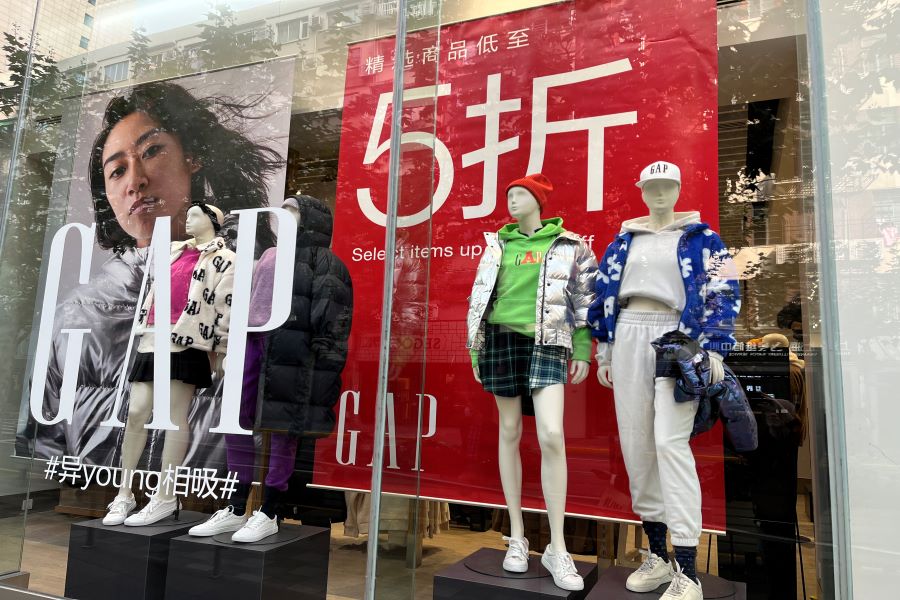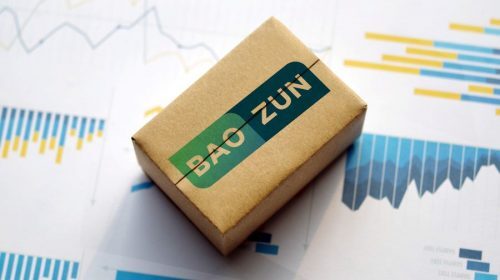Baozun Emerges from E-Commerce Shadows with Gap China Purchase

The provider of e-commerce tools with close ties to Alibaba hopes its acquisition of the U.S. retailing giant’s China operations can revive its stalling growth
Key Takeaways:
- Baozun’s newly purchased Gap Greater China operation will become the cornerstone for its new brand management unit
- The Alibaba-backed company is looking for new growth venues as its core business as an e-commerce tools provider stalls
By Shirley Lau
Baozun Inc. (BZUN.US; 9991.HK), a sort of “Shopify of China,” raised eyebrows earlier this month when it announced it would acquire U.S. clothing retailer Gap Inc.’s (GPS.US) China business.
The move baffled many because the Chinese e-commerce services provider has never managed a brand, let alone one whose mainstay lies outside its traditional e-commerce realm. And Gap was hardly a winner, at least not in China, where it was battling years of declining profits and sales as it competed with a crowded field of slicker domestic and global rivals.
Baozun said it would acquire Gap Greater China for a meager primary consideration of $40 million, or up to $50 million after adjustments. That’s a tiny fraction of Gap’s own enterprise value of $10.17 billion, showing just how little it valued its China business. As part of the deal, Baozun, which is backed by e-commerce giant Alibaba (BABA.US; 9988.HK), said it received exclusive rights to make and sell Gap’s products in Greater China for up to 20 years.
Investors were not impressed by the unusual marriage. Baozun’s U.S.-listed shares fell 16.5% after the Nov. 8 announcement, while Gap fared only slightly better with a 7.3% drop. Baozun’s shares have rallied since then and are now up 2.7% over pre-announcement levels on broadly improving sentiment towards China stocks last week.
Gap’s decision to sell its Greater China business, which includes the Chinese mainland, Taiwan and Hong Kong, comes as little surprise since it wasn’t going anywhere fast as the U.S. company struggled with slumping sales worldwide. The 53-year-old American brand entered the Chinese mainland in 2010 with big hopes, a few years behind global rivals Zara, H&M and Uniqlo. Its next 12 years were marked by both achievements but more often setbacks.
Like many big retail brands, Gap announced a lofty goal of opening 1,000 shops across China when it entered the country. But it never reached that mark. It yanked its Old Navy chain from the market in 2020, just six years after the sub-chain entered China, at which point its brick-and-mortar store count began to shrink during the global pandemic. Its mainland China store count has shriveled steadily since then, falling from 200 in March last year to just 118 Gap stores now. By comparison, Uniqlo now has over 800 shops across the country.
Gap’s China financials weren’t pretty either. Its mainland entity being acquired by Baozun logged a post-tax net loss of 256 million yuan ($35.34 million) in 2021, while the Taiwan unit lost T$199.8 million ($6.24 million) on a similar basis for its financial year through Jan. 29, 2022.
As its situation in China and globally worsened, Gap reportedly reached out to potential suitors as early as March last year to gauge interest for its China business. By spinning off the Greater China unit to a local owner, the brand could continue to maintain a presence in the world’s second biggest economy without having to directly bear the financial stress. That approach has also been used in China by other struggling global brands like Carrefour and Tesco.
E-commerce partner
So, who exactly is Baozun, which is hardly a household name globally or even in China? As a provider of software tools for e-commerce companies, Baozun has been Gap’s e-commerce service partner in China since December 2018. In the process of working together, Baozun has presumably acquired a great deal of first-hand data on Gap’s local operations that could help with the brand’s revival. Baozun has also been looking for new opportunities as growth as its own core business slows.
Founded in 2007 in Shanghai, Baozun helps international and domestic e-commerce merchants set up China stores by providing a wide range of back-end services they need to operate. The company was traditionally closely tied to Alibaba’s Tmall, where many major global brands operate flagship online China stores. It counts big names as its clients, such as Philips, Nike, Microsoft and Starbucks.
Following years of rapid growth, Baozun listed on Nasdaq in 2015, with Alibaba as its biggest single shareholder. It made a second listing in Hong Kong in 2020 to expand its investor base and liquidity. But after years of expansion, the company’s growth has slowed sharply as China’s economy slows and the e-commerce market matures.
Reflecting that, Alibaba posted its first-ever revenue decline in its reporting quarter through June this year, while rival JD.com also recorded its slowest growth. Baozun’s own performance has stumbled in line with the broader sector. Its revenue fell 5.1% year-on-year in the first half of the year, as it swung to a net loss from a profit over the same period.
Baozun has been gearing up for the challenge as its business slowed. It made several diversification moves last year to broaden its portfolio, including its acquisition of brand management consultant Full Jet, and its formation of a strategic alliance with financial conglomerate Fosun’s luxury arm, now known as Lanvin Group. It also acquired eFashion China, another e-commerce services provider, to widen its reach in the branded fashion sector.
Signaling its intent to diversify beyond its original business, Baozun announced the establishment of a new business unit, Baozun Brand Management (BBM), at the same time as its Gap purchase, saying the unit would “engage in longer and deeper relationships with brands.” It noted the Gap acquisition marked “a significant step in developing BBM.”
Managing its own brick-and-mortar shops for the first time will come as a definite change of pace for Baozun, and it remains to be seen if it can succeed where the U.S. retailing giant struggled. After all, Gap is facing its own identity crisis in China, seen as neither a luxury brand nor a value-for-money among local consumers. And in the world of fast fashion, Gap’s unchanging American casual style of products like hoodies emblazoned with a big Gap logo and stripe patterns are now deemed outmoded by increasingly sophisticated Chinese shoppers.
Gap isn’t alone in facing headwinds in China. In March last year, H&M closed about 20 stores in the country after a controversy erupted over the brand’s boycott of Xinjiang cotton. It closed 60 outlets in the country by the end of the year, accounting for 12% of its total, and this year it closed its 15-year-old first Chinese store in Shanghai. Analysts have noted the closures were more about fierce competition than other factors. In July this year, Zara’s trio of Bershka, Pull&Bear and Stradivarius all shut their Tmall flagship stores and left China. Apparel giants Nike and Adidas have also lost momentum in China to native brands Li Ning and Anta Sports.
That said, perhaps Baozun can use its e-commerce expertise to turn things around for Gap in China. The tired Fila name did something similar after being acquired in 2009 by Anta, which repositioned it as a high-end sports fashion brand.
To subscribe to Bamboo Works weekly free newsletter, click here






